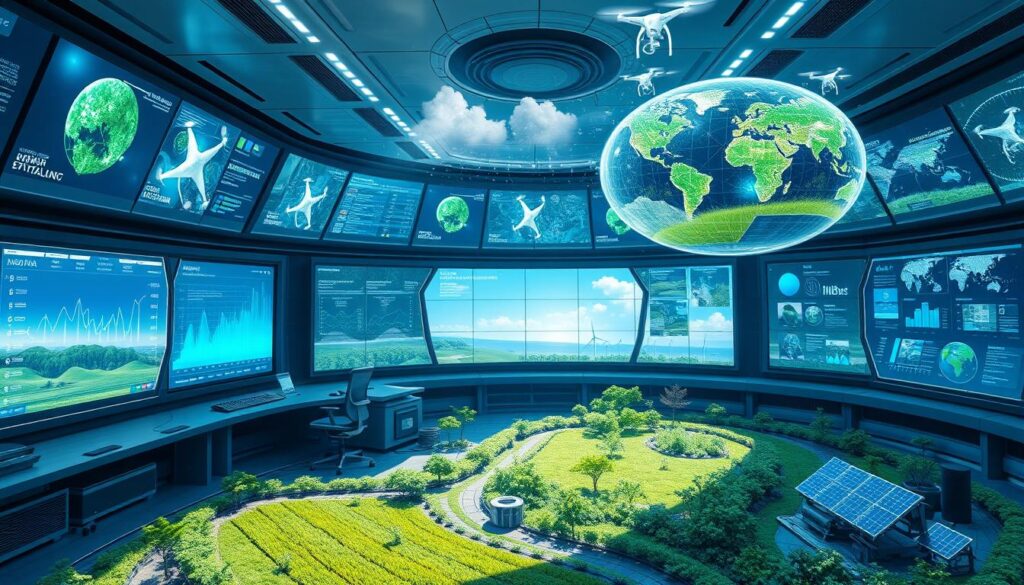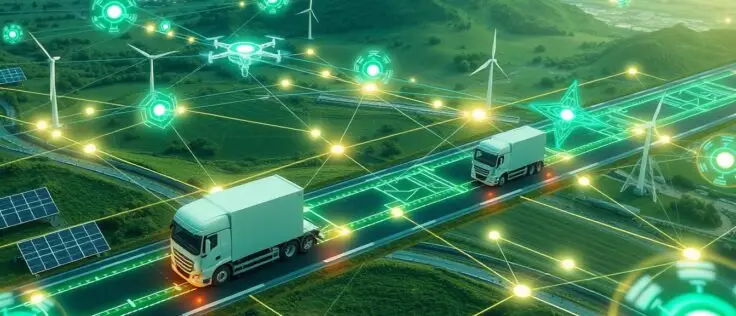Supply chains are vital for businesses around the world. Making them sustainable can seem like a big challenge. However, using artificial intelligence (AI) in these networks marks a significant step. It’s not only about handling massive amounts of data but also about boosting environmental sustainability1.
Governments are pushing for greener practices. The United Nations stresses the role of reliable AI in sustainable growth. Thus, AI becomes key in making logistics more eco-friendly2
The essence of AI in supply chains reveals how in-depth data analysis and real-time monitoring are shaping our industries. With predictive strategies, these goals are no longer just dreams. They’re becoming our reality.
Understanding the Role of AI in Green Logistics
Artificial intelligence (AI) is starting a new phase in logistics, focusing on sustainability. This technology helps firms lower their carbon emissions by changing old methods into greener solutions.
The Vitality of Sustainable Supply Chains
AI improves supply chains by making them more transparent and efficient. This cuts down on excess production and waste3. It predicts the need for products accurately, keeping stock levels just right. This avoids extra goods and their negative effect on our planet3. Using AI, companies meet environmental standards better and save money, showing green practices can be cost-effective too3.
AI's Impact on Environmental Efficiency
AI processes huge data sets on traffic, routes, and weather. It helps logistics firms save money and keep nature safe3. These smart methods lead to more eco-friendly logistics, boosting both the environment and the economy.
AI and Its Transformative Power in Sustainable Supply Chain Management
The introduction of artificial intelligence (AI) in managing supplies is a big leap towards better sustainability. This change helps companies to operate more efficiently and to focus on ethical sourcing and taking care of the environment. AI helps to analyse and track stock levels accurately, reducing waste significantly4.
AI technology gives deep insights into the ethics of suppliers by using different data, like social media and public records. This way, businesses can make choices that are good for both the planet and their brand4. Also, AI tools that optimize delivery routes help to cut down carbon emissions by reducing unnecessary travel and idling time. This highlights AI’s role in protecting the environment and making supply chains more resource-efficient4.
For AI to work well in ethical sourcing and supply management, the data used must be top-quality. This ensures that decisions made with AI are trustworthy and transparent5. As AI becomes more common in supply chains, merging human skills with AI’s precision is crucial. This mix helps create solutions that are just right for each situation, leading to smarter decisions and better responses to changes5.
Thinking about these new developments, it’s important to make sure AI-driven actions match up with long-term goals for sustainability. Businesses should use advanced AI inventory management solutions for continuous checks. This approach ensures that their operations are efficient and eco-friendly4.
To fully benefit from AI in managing supplies, especially in global logistics, companies need to invest in training. This training will give employees the skills needed to use AI effectively, boosting the sustainability of supply chains4.
Using AI in supply management isn’t just about doing things better. It’s also about promoting responsible and sustainable trade worldwide. With the rapid growth of technology, AI’s smart integration is key to shaping a greener future in supply chain management.
AI in Supply Chain Sustainability: A Strategic Approach
In our connected world, a focused strategy for sustainability is very important. AI is key in making supply chains more sustainable. It helps make them efficient, supports responsible sourcing, and cares for the environment.
Innovative AI Analytics for Sustainable Practices
AI uses advanced analytics to look at big datasets. This helps to manage and cut down environmental harm. Siemens uses AI to create Digital Green Twins. These measure how much carbon a product makes during assembly. They also look at how it affects important resources like water6. Also, tools like the SiGREEN let companies track and lower CO2. They can do this in real-time, which improves how they watch and reduce their carbon footprint6.
AI also helps to balance inventory and demand. This cuts down on too much production, waste, and environmental harm. At the same time, it increases profits. These AI solutions show how to look after the environment while also doing well economically. They do this by using resources wisely.
Enabling Real-Time Visibility and Ethical Sourcing
AI gives a clear view of supply chain processes in real-time. Tools like the CWA let suppliers see their environmental impact. This makes the supply network more ethical6. Being able to see everything clearly helps companies make good choices. These choices meet global sustainability goals and what customers expect.
AI doesn’t just offer real-time data analysis and better visibility. It also helps share information better and creates sustainable value in the supply chain7. AI solutions are very important for reaching the strategic, operational, and ethical aims of supply chains today. They make them more efficient, environmentally friendly, and quicker to respond.
Driving Resource Optimization Through AI-Enhanced Strategies
The use of AI is changing how we use resources and helps us work towards sustainability. AI tools predict and plan better, so less is wasted. This helps the planet and our goals.
AI strategies by firms like Unilever and Walmart are great examples. They track carbon footprints accurately and manage stock to cut down on waste and emissions8.
Advanced AI Tools for Carbon Footprint Tracking
AI models let companies look at a lot of data to watch and change how much energy they use.
This helps them be more green and understand their environmental impact9. These tools help companies follow strict rules and give transparency that customers want.
AI Algorithms for Waste Reduction
AI helps reduce waste by making transportation more efficient, cutting down CO2 emissions.
Brands like Volkswagen and Adidas use AI to recycle and reuse materials effectively8.
AI doesn’t just help the environment; it also makes companies stronger economically.
Using AI helps businesses stay efficient and meet standards. It’s important for both the environment and staying ahead in business.
Improving Environmental Impact Monitoring with AI Innovations
AI innovations are changing how we monitor the environment in various industries. They make the process more accurate and simpler. For example, AI helps adjust routes in real-time. This lowers the carbon footprint, showing the power of smart logistics in cutting down emissions10.
AI is also key in making recycling better and designing products that use less material. This supports our goal to be sustainable and reduces the environmental impact of making and using products10. AI can also spot safety hazards in the supply chain. This makes workplaces safer and helps companies follow strict environmental rules10.
AI helps us understand the environmental practices of our suppliers. It encourages working with those who meet high sustainability goals. This is important because indirect emissions like procurement can be a big part of a company’s carbon footprint, especially in making and selling goods10.
Some worry about how much energy AI uses. But new, efficient AI models and using renewable energy for AI tasks are solving this problem. This is crucial for making AI technologies sustainable for the environment11.

In the end, AI greatly improves how we monitor and manage the environment. It helps businesses achieve their sustainability goals. With AI, companies are better at protecting the environment, which is vital for a sustainable future.
Empowering Sustainable Decision Making with AI Analytics
The use of AI analytics in supply chain operations is key for improving sustainable decision making. These tools help businesses examine and improve their impact on the environment with great accuracy. By tapping into the deep web, which is about 90% of the internet, AI can analyse big datasets that are crucial for informed choices12.
Currently, a small portion of online data shapes vital business decisions. But, AI tech allows companies to look at much more info. This can lead to big environmental and operational gains12. It makes processes more efficient and improves the tracking of supply chains. This ensures every part of the supply chain is looked after and made more eco-friendly.
Data-Driven Insights for Efficiency Improvements
AI analytics help organisations start strong sustainability projects and make smart, lasting decisions. With AI, companies can create innovative strategies that go beyond global sustainability rules. These include standards by the EU and UK on renewable energy and cutting emissions12.
AI-Powered Tools for Supply Chain Traceability
Supply chain traceability is crucial and a strategic asset now. AI platforms offer a detailed look at sustainability, tech developments, and market opinions. This helps understand supply chains from start to finish. By using AI in market intelligence, businesses can invest wisely and pick the best tech for zero-emission goals. This is vital for moving towards eco-friendly industrial practices12.
Maximising Supply Chain Visibility with AI Technology
Advancements in AI technology greatly improve how we see and manage supply chains. It gives organisations a deep look into how things move and operate. This better view is possible because AI can go through huge amounts of data. This helps make supply chains work better and track things more closely. AI finds and fixes hidden problems, making sure everything is traceable – good for businesses and buyers.
For example, AI helps in tracking goods in real time using barcodes and GPS. This makes sure things come from good sources and helps customers trust the sustainability promises of brands. Also, using AI can boost sales13 by keeping the right amount of stock through smart systems that predict what’s needed.
Statistics show more companies will put money into AI for supply chains. This will help them work better and save money14. AI can also cut the cost of products by up to half14. Plus, AI helps predict and avoid problems before they happen14, which means companies might not lose as much money during sudden issues14.
AI tools that work on their own in supply chains reduce the need for people to do the work. This makes things faster and safer, reducing mistakes or accidents. These improvements make sure customers get their deliveries on time and enjoy good service. This means businesses can work more efficiently and keep customers happy.
In wrapping up, using AI in supply chain management brings a lot of benefits. It makes everything more clear, works more efficiently, and supports sustainable business by tracking and managing inventory better. By cutting costs and increasing productivity, AI is changing supply chains worldwide in exciting ways.
Fostering Collaborative Data Sharing and Partnerships in Sustainability
Using Artificial Intelligence (AI) in sustainability efforts within supply chains is becoming important. It helps to share data and build strong sustainability partnerships. By using AI, companies can improve how they work together. This is key to creating sustainable business networks.
AI as a Catalyst for Cross-Stakeholder Engagement
AI brings together different groups, like suppliers, consumers, and regulators, to work towards common sustainability goals. It helps share data effectively, making decisions about sustainability better and faster. For example, AI tools analyse supply chain data well. This lets everyone see what needs improvement15.
Creating Ecosystems of Sustainability Through AI-Driven Collaboration
AI does more than analyse data. It helps build networks where companies co-operate within a larger sustainability circle. This makes it easier to tackle big challenges, like changing sustainability rules and the need for standard data sharing16. By using AI, businesses can prepare for and adapt to these changes. This helps supply chains meet current and future sustainability standards.
In summary, AI’s role in sharing data and building partnerships is very important. Businesses should keep investing in AI. This keeps them leading in sustainability efforts. It makes sure their operations help the environment and society17.
Challenges in Integrating AI within Supply Chains for Sustainability
Artificial intelligence (AI) has the power to greatly improve supply chain sustainability. Yet, there are big hurdles to overcome. These hurdles include difficulties in merging data, AI integration problems, and worries over the return on investment in sustainability. Each is impacted by various factors.
Data Integration and Accuracy Concerns
Mixing AI into supply chains is tough due to major data merging challenges. Making sure data is accurate and fits well across different systems is hard. According to a 2022 study, 72% of executives mentioned environmental impacts as a key concern for their supply chains18. GEP also points out that AI can make sense of complex data and give useful insights. These insights are vital for making good decisions in managing supply chains19. But, the first steps of integrating can be slowed down by isolated data and inconsistencies. This makes AI systems less effective.
Overcoming Obstacles in Adoption and Return on Investment
Challenges in using AI are not just about technology. They also involve money and people. A third of executives in 2022 believed their companies would largely use AI in supply chains by 202518. However, the rate of adopting AI depends a lot on showing a clear benefit in sustainability. This can be hard to do at first. Firms should carefully invest in good data management and start with pilot projects to show what can be gained. These projects have led to impressive results. For example, warehouses that started using AI saw worker travel time go down by up to 20% and order processing speeds rise by 15%18. Also, thorough training is crucial to make sure workers can use the new AI tech well.
Future Prospects of AI in Enhancing Supply Chain Sustainability
AI is changing the game in making supply chains more sustainable, efficient, and green. By 2024, it’s set to make inventory handling and operation flows much better. This will cut costs and make supply chains stronger against problems20. This vision is supported by the growing use of AI to make fast, profitable decisions, which enhances risk management and planning20.
Moreover, technologies like digital twins are revolutionizing supply chain monitoring for retailers and manufacturers. Currently, 21% have started using digital twins, and 24% plan to do so21. This increase shows a move towards more flexible supply chains, powered by AI’s ability to accurately predict demand20.
AI is clearly leading the way towards a more sustainable and effective worldwide supply network. The ongoing development and application of AI technology are set to greatly improve sustainability, making the supply chain more resilient, competitive, and eco-friendly.
Conclusion
The journey towards sustainability is now closely linked with AI. This technology is crucial for businesses that want to keep their supply chains green. They’re using AI to closely monitor activities, predict future trends, and conduct thorough checks on suppliers. This increases the openness of how things are done22. IBM’s Watson Supply Chain is a great example. It helps spot possible issues quickly. This ensures companies meet the high standards for environmental care22. Big names like Unilever and Walmart are changing things up. They use AI to make sure they source materials in a way that’s good for the planet and cut down on waste22.
AI’s power to predict is transforming supply chain management. This affects everything from stock levels to how warehouses work and even machine care23. It makes the whole system more efficient, by making better forecasts about orders and how well suppliers are doing23. Look at Coca-Cola. They’re using AI to be more eco-friendly, by focusing on lowering water and power use22. AI also helps in making delivery routes better. This is key in reducing the carbon footprint around the world23.
However, bringing AI into green supply chains is not without its problems. There are issues with keeping data accurate and the cost of such technologies. But, wisely using AI is essential for staying ahead in a market where eco-friendliness matters a lot. The merging of AI with sustainable practices in supply chain management is a big step forward. It’s about creating new eco-friendly innovations and caring for our planet’s resources globally.
FAQ
How does AI enhance supply chain sustainability?
AI helps make supply chains sustainable by better managing and analyzing data. It allows real-time tracking and better use of resources. Thus, companies can meet sustainability goals more effectively.
What is the impact of sustainable supply chains on the environment?
Sustainable supply chains significantly reduce harm to the environment. They encourage the use of green practices and ethical sourcing. This leads to lower carbon emissions, less waste, and better environmental outcomes.
How do AI analytics contribute to sustainable supply chain management?
AI analytics offer deep, data-based insights for supply chains. They help companies watch their carbon footprint, manage inventory well, and take steps that are good for the planet.
What are some examples of AI tools used for tracking carbon footprint?
Tools like Digital Green Twins, Carbon Web Assessment (CWA), and SiGREEN track carbon footprints. They provide precise emission data for products and the supply chain.
In what ways can AI technology reduce waste in supply chains?
AI minimises waste by predicting when machinery might fail and by making transportation more efficient. This cuts down on emissions and saves resources.
How does AI improve the monitoring of environmental impacts in supply chains?
AI uses tools such as Digital Green Twins and CWA for better environmental monitoring. These allow accurate tracking of product impacts and emissions, helping to tackle environmental harm.
Can AI analytics enhance supply chain traceability and transparency?
Definitely, AI analytics boost both traceability and transparency in supply chains. They help spot efficiencies, improve accountability, and support ESG reporting, building trust through visible green efforts.
What role does AI play in supply chain visibility?
AI greatly enhances supply chain visibility with modern software and tracking technologies. This allows for the real-time follow-up of goods and ensures responsible sourcing is verifiable.
How does AI foster collaborative data sharing and partnerships in sustainability?
AI encourages businesses to share significant sustainability data and work together. This joint effort helps develop sustainable practices and align goals across the supply chain.
What are the main challenges of integrating AI in supply chains for sustainability?
Integrating AI comes with challenges like data compatibility, high initial costs, and training needs. These can be overcome with good data systems, pilot projects, and thorough training.
What are the future prospects of AI in enhancing supply chain sustainability?
AI’s future in sustainable supply chains looks promising. It’s set to boost environmental responsibility, offer a competitive edge, and make operations more resilient to eco-conscious markets, focusing on sustainable design and risk management.
Source Links
- Embracing AI and Sustainability at the Forefront of Supply Chain Evolution – https://www.techuk.org/resource/embracing-ai-and-sustainability-at-the-forefront-of-supply-chain-evolution.html
- Using AI to Build Sustainable Supply Chains: A Global Shift Towards Eco-Friendly Practices – https://www.linkedin.com/pulse/using-ai-build-sustainable-supply-chains-global-shift-mark-vernall-hsesc
- AI and Eco-Innovation in Supply Chain: Forging Paths to Green Logistics – https://medium.com/@sambit_97894/ai-and-eco-innovation-in-supply-chain-forging-paths-to-green-logistics-8812ffbcb526
- The Transformative Power of Artificial Intelligence in Building a Sustainable Supply Chain – https://www.bbntimes.com/companies/the-transformative-power-of-artificial-intelligence-in-building-a-sustainable-supply-chain
- The Transformative Power of AI in Supply Chain Management – https://www.scmglobe.com/the-transformative-power-of-ai-in-supply-chain-management/
- AI in Supply Chain Management: Reaching Sustainability Goals Faster through Data-Driven Practices? – https://www.linkedin.com/pulse/ai-supply-chain-management-reaching-sustainability-goals-staubitzer
- Reviewing the Roles of AI-Integrated Technologies in Sustainable Supply Chain Management: Research Propositions and a Framework for Future Directions – https://www.mdpi.com/2071-1050/16/14/6186
- Driving Sustainability with AI: Strategies and Success Stories – https://lspr-education.com/2024/04/29/driving-sustainability-with-ai-strategies-and-success-stories/
- Optimizing Supply Chain Efficiency in 2024 Through AI and Sustainability – https://www.jusdaglobal.com/en/article/enhancing-supply-chain-efficiency-2024-ai-sustainability/
- Transforming Supply Chains: The Pivotal Role of AI in Advancing ESG Goals | Barnes & Thornburg – https://btlaw.com/insights/alerts/2024/transforming-supply-chains-the-pivotal-role-of-ai-in-advancing-esg-goals
- TGRC Limited t/a The Green Recruitment Company Innovation in AI and Sustainability – https://www.greenrecruitmentcompany.com/blog/2024/07/innovation-in-ai-and-sustainability
- Empower sustainable decision-making with AI and analytics – Sustainability Voices – https://sustainabilityvoices.co.uk/2023/11/empower-sustainable-decision-making-with-ai-and-analytics
- Artificial Intelligence (AI) in Supply Chain and Logistics – https://throughput.world/blog/ai-in-supply-chain-and-logistics/
- 7 Ways to Leverage AI to Maximise Supply Chain Efficiency – https://procurementmag.com/technology-and-ai/7-ways-to-leverage-ai-to-maximise-supply-chain-efficiency
- Strategies for creating a collaborative ecosystem that benefits all… – https://implementconsultinggroup.com/article/why-end-to-end-supply-chain-collaboration-matters
- PDF – https://www.movinonconnect.com/wp-content/uploads/2023/11/MovinOn_CGI_Michelin_report_sustainability_data_sharing.pdf
- Green supply chain management: Embracing AI and technology for success – Permutable – https://permutable.ai/green-supply-chain-management-embracing-ai-and-technology/
- The Role of AI in Supply Chain Management in 2024 | SPD Technology – https://spd.tech/artificial-intelligence/artificial-intelligence-in-supply-chain-challenges-and-applications/
- The Role of Artificial Intelligence in Creating Sustainable Supply Chains – https://www.gpsi-intl.com/blog/the-role-of-artificial-intelligence-in-creating-sustainable-supply-chains/
- Future of AI in Supply Chain: What You Need to Know – https://throughput.world/blog/future-of-ai-in-supply-chain/
- Future of AI in the Supply Chain – https://consumergoods.com/future-ai-supply-chain
- AI-Driven Supply Chain Transparency: Transforming ESG Practices. – https://www.linkedin.com/pulse/ai-driven-supply-chain-transparency-transforming-esg-abkjc
- The Future Impact of Artificial Intelligence on the Global Supply Chain – https://urbeuniversity.edu/blog/the-future-impact-of-artificial-intelligence-on-the-global-supply-chain






